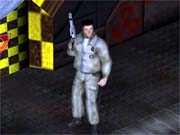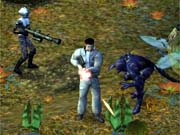The Sci-Fi Channel's successful series Farscape is currently in its fourth season and has built up a loyal fan following. The ongoing story of a band of escaped prisoners in a pregnant space whale named Moya is similar enough to Star Trek to be familiar--it's your standard intergalactic potpourri of characters traipsing from one adventure to another. But under the creative guidance of the Jim Henson Company, it has enough of an exotic rogue element to feel fresh, with advanced puppetry, elaborate makeup effects, distinctive production design, some controversial ongoing story arcs, and lots of Australian accents. You'd think someone would be able to make a pretty interesting game using this license. Unfortunately, you'd be wrong. Instead of drawing from the rich source material of the TV show, Farscape is a conventional action game with a clunky interface and a dated engine.

The game jumps right into the Farscape universe without so much as a "how do you do." Start the game and suddenly you're watching a barely comprehensible cutscene in which some people fly out of a spaceship and crash-land on a planet. Then you're at the scene of the landing, where some guy is calling some blue girl "Pip." They're engaging in witty repartee as if they'd known each other for years, but if you're not a fan of the show, you may have no idea who they are. Before you know it, you're being hit on all sides with references to Aeryn's Prowler, DRDs, Pilot, the Nebari, the Authority, and Moya's baby. These references are great for fans of the show, but they'll probably leave everyone else at least a bit confused.
The game's story is divided into acts, which are further divided into missions for one to three of the show's characters. Your first several missions are, as you might have guessed, to get parts to repair your ship. Then you run around and undertake more quests, one of which involves investigating a forest. Literally. You find a forest, you investigate it. The game ends with (you may have seen something like this in about a billion other sci-fi movies and TV shows) overheating a reactor to blow up a base, which basically means that you walk around to different consoles while a Klaxon blares half-heartedly in the background.
Farscape's gameplay is really basic. You control one character, and the computer controls everyone else. Your job is basically to shoot stuff while following a purple arrow that guides you to your next goal, whether it's another character, a key, an exit, a forest that needs investigating, or whatever. There are two half-baked attempts at stealth missions, as well as a few instances when characters have to separate to solve some painfully obvious puzzle, but these slight changes of pace provide no consolation.
Farscape's combat interface is clunky at best. There's an automatic tracking system that locks on to enemies for you, so your job is basically to hold down the fire button. You can move around while you're shooting, but if you do, you're just going to confuse everything. The health system is like Halo's, in which characters sustain damage to an automatically replenishing "vitality" before losing actual hit points. This means that you can save your med kits by resting up between battles. It's a good idea in theory, but in Farscape, it means there's a fair amount of waiting around. The small variety of weapons is distinguished mainly by what type of damage they do. Different weapons cause different amounts of damage to different enemies, but Farscape's inventory system makes it all but impossible to swap weapons around on the fly. Ammo is limited, which leads to some really tedious situations in which you'll have to run back and forth selling the stuff you've gathered to replenish your ammo. It's a bit like Diablo, in which you had to constantly run back to town to sell your loot. Farscape's inventory system is like that, but in a bad game.

For such a combat-oriented game, Farscape makes poor use of its characters. The most likely candidates for combat, the warrior D'Argo and the commando Aeryn, don't come into the game until the end, and even then their appearances are little more than cameos. At least D'Argo is presented with his whip tongue and Qualta blade. Although Rygel has thrown bombs and drawn blood in the TV show, for some reason he isn't allowed to use a weapon in the game. You'll have to replay a lot of missions because his lack of speed and defenses gets him killed. The main candidate for pacifism in the fiction of Farscape is the blue, bald, and buxom priestess Zhaan. However, except for one instance in which she insists on trying to negotiate, she spends the game blithely blasting the living daylights out of anything that moves.
Farscape has some interesting textures and color schemes. There's even an occasional sporting try at interesting geometry. But the game's blocky, low-polygon graphics and stiff animation make the game look extremely dated. The game's collision detection is extremely poor, so the combat looks bad. The special effects look like rehashed effects from a thousand other games. Because the camera wanders all over the place, objects and walls turn transparent with alarming frequency. The sound consists of workaday engine humming, gun zapping, and combatant grunting, with the show's distinctive soundtrack playing in the background.
Farscape's graphics engine adequately presents the aforementioned stereotypical alien planet, which looks like almost every other alien planet since Half-Life's Xen. But it's really disappointing when it tries to re-create the TV show's unique production design. When the game finally goes on board the Moya, you'll find that it bears no resemblance to Rick Eyres' distinctive design (with the possible exception of a glimpse of Pilot's station). Instead, you mostly see murky textures, blocky corridors, a few consoles, some crates, and some barrels.
Farscape really doesn't do justice to the original TV show, which is disappointing, since the developer clearly had some idea of what the show is about. The game gets a lot of mileage out of the fact that Rygel hates being sent into small spaces because of his size. The game even shows the basics of how Crichton interacts with his alien friends. The snippets of dialogue (gamely recorded by the actual cast) provide an inkling of Farscape's main appeal, namely the interaction among the characters. But the game, and its slavish emphasis on shooting stuff, serves as a horrible showcase for any sort of character interaction. It offers no insight into the rich universe of the TV show and does nothing to reproduce the sense of watching an episode of Farscape. Ultimately, this game feels exactly like what it is: a throwaway licensing opportunity that really should have been thrown away.